In today’s economy, saving money is more than a practice—it is essential to financial survival and growth. Surprisingly, many individuals lack adequate savings, which can lead to economic vulnerability. This guide delves into creative and engaging ways to enhance your savings without diminishing your quality of life. By exploring various innovative methods and long-term strategies, we aim to equip you with the tools to meet and exceed your financial goals.
Clever ways to save money—This keyword complements “creative money-saving tips” by suggesting more ingenious or less conventional saving methods, offering your readers diverse strategies.
Here are the 30 money-saving tips
1. Start a Budget: Establishing a budget is essential for managing your finances effectively. It helps you track where every dollar goes and identifies potential savings. By setting spending limits and monitoring your progress, you can make informed decisions that prevent financial strain. A well-planned budget encourages discipline and helps prioritize essential expenses, paving the way for economic stability and growth.
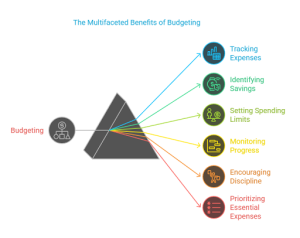
2. Automate Your Savings: Automating your savings removes the temptation to overspend by allocating funds directly to your savings account each payday. This ensures that saving money becomes a regular habit, much like paying a bill. Over time, even small amounts accumulate, creating a substantial financial cushion to support future investments or cover emergency expenses.
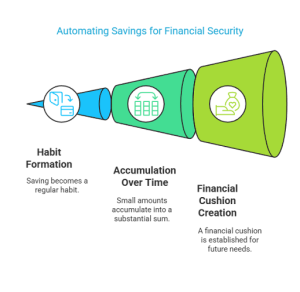
3. Download Money-Saving Apps: Leveraging technology can significantly enhance saving efforts. Money-saving apps provide tools for tracking spending, scanning receipts for cashback, and alerting you to discounts. They simplify managing your finances and help ensure you’re always getting the best deal, making it easier to stretch your budget.
Mint: Offers comprehensive tools for budgeting and managing your finances by linking all your financial accounts in one place, allowing you to track expenses and manage budgets effectively. Mint Official WebsiteHoney: A browser extension that automatically finds and applies the best coupons at checkout and offers rewards through Honey Gold. Honey Official Website
Ibotta: A cashback app that allows you to earn money back on purchases by completing simple tasks, scanning receipts, and shopping online.
Rakuten: Provides cashback and coupons when shopping online at affiliated stores, with the rewards sent quarterly.
Acorns: Rounds up your purchases to the nearest dollar and invests the difference, which makes saving and investing seamless.
You Need a Budget (YNAB): This app helps users meticulously plan their budgets to break the paycheck-to-paycheck cycle and improve financial health.
Chime: Offers a fee-free spending account with automatic savings features, such as rounding up purchases to save the difference.
Fetch Rewards: Earn rewards by scanning shopping receipts. Points can be redeemed for gift cards and other rewards.
GasBuddy: This site helps you find the cheapest gas prices nearby and offers a payment card that saves you money per gallon at the pump.
GoodRx: Provides discounts on prescription medications by comparing prices across pharmacies and offering coupons.
Start Meal Planning: Meal planning is a powerful strategy to trim grocery expenses and cut down on food waste. Setting aside weekly time to plan your meals ensures you purchase only the necessary ingredients. This approach helps curb impulsive snack purchases and expensive, last-minute dining out. Beyond saving money, meal planning encourages healthier eating habits by promoting more home-cooked meals, which often have better nutritional value than fast food or takeout. By being intentional with your shopping list, you maintain your budget and foster a more nutritious and sustainable lifestyle.

Check-in on Subscriptions: Regularly checking your subscriptions is like cleaning out your closet: it’s all about removing what you don’t use and keeping only what truly benefits you. Take a moment each month to review all your subscriptions—whether it’s streaming services, fitness apps, or online magazines. Ask yourself: “Am I using this?” If the answer is “no,” or if you haven’t used the service in months, it’s time to unsubscribe. This can prevent those sneaky small charges from accumulating a hefty sum over time. For the subscriptions you do use, consider if there’s a cheaper or more valuable alternative available. This regular audit frees up your budget and ensures that every dollar you spend enhances your life, giving you more control and satisfaction over your finances. Make it a fun monthly

Check-in on Subscriptions:
Save Money on Books: Embracing libraries and e-book platforms offers a savvy and cost-effective alternative to buying books. Many libraries now provide online access to various books and audiobooks, significantly reducing entertainment expenses. This digital shift means you can enjoy a vast library from the comfort of your home without wasting time. Swapping books with friends or frequenting second-hand bookstores can enrich your reading experience without impacting your wallet. These methods save money and promote a culture of reuse and sharing, adding value to each book’s lifecycle. Dive into the world of reading economically, and you’ll find your budget—and bookshelf—will thank you.

Compare Grocery Prices: Comparing prices at different stores is a smart way to stretch your grocery budget. Use apps and check weekly sales ads to identify the best deals before you shop. This proactive approach can lead to substantial savings. Additionally, buying in bulk can lower the cost per unit, and choosing generic brands over name brands can save you money without sacrificing quality. These strategies not only make your grocery shopping more budget-friendly but also more efficient. Planning your purchases around the best available prices maximizes your spending power and ensures you get the most value for every dollar spent.
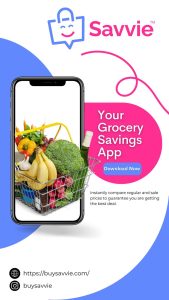
Ditch Your Gym Membership: If you’re not making the most of your gym membership, it may be financially wise to cancel it and explore more cost-effective exercise options. Many communities offer free fitness classes in parks or community centers. Alternatively, outdoor activities like hiking, running, or cycling can be enjoyable and free. For those who prefer to exercise at home, numerous online platforms offer free or low-cost workout videos that range from yoga to high-intensity interval training (HIIT). These alternatives save money and add variety to your fitness routine, making it easier to stay motivated without the burden of a monthly gym fee.
Find Free Events: Your local community is a treasure trove of free entertainment and educational opportunities. From art exhibits and creative workshops to regional festivals and live performances, you can immerse yourself in culture without spending a dime. To keep up with what’s available, regularly check community bulletin boards, visit your local library’s website, and follow local organizations on social media for announcements on upcoming events. This approach supports your local community and enriches your personal and family life through diverse, cost-effective experiences.
Start a Garden: Exploring your local community for free entertainment and educational events can be a fantastic way to enjoy rich cultural experiences without impacting your budget. Community centers, libraries, and regional arts organizations often host events like art exhibitions, workshops, festivals, and live performances. Staying informed about these opportunities is easy—regularly check community bulletin boards and the websites of local libraries and follow relevant organizations on social media. Engaging with these resources not only supports the community but also brings diversity and enrichment to your personal and family life, all while being cost-effective. This approach allows you to connect with your community, learn new things, and enjoy quality time with friends and family without spending money.
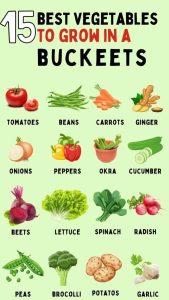
Analyze Your Credit Card Habits: Monitoring your credit card usage is crucial for avoiding high-interest charges and managing debt efficiently. To make the most of your credit cards, select ones that offer rewards or cashback programs that align with your regular spending patterns. Such programs can provide valuable benefits for expenses you’d incur anyway. Aim to pay off your balance in full each month to prevent interest accrual. This disciplined approach helps maintain a healthy credit score and maximizes the benefits of using credit cards without falling into costly debt traps. By staying vigilant and using credit cards strategically, you can enhance your financial health and potentially earn rewards that add value to your purchases.
Avoid Impulse Purchases: Implementing a cooling-off period is an effective strategy to curb impulse buying. By allowing yourself a few days to think about a non-essential purchase, you give yourself time to consider if you truly need the item or if the desire to buy was just a passing whim. This pause can significantly reduce unnecessary spending. During this time, assess the value the item would add to your life and whether it fits within your budget. Often, you may find that the urge to buy diminishes after some reflection, saving you money and helping you maintain financial discipline. This approach keeps your spending in check and aligns your purchases more closely with your long-term financial goals.
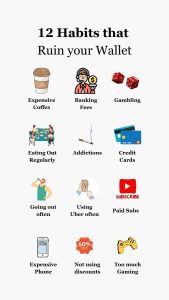
Unsubscribe From Marketing Emails: Marketing emails are often designed to entice spending through constant promotions and exclusive deals. You can significantly reduce these temptations by unsubscribing from retail newsletters promoting impulse buying. This action declutters your inbox and shifts your focus towards intentional purchasing. Managing your email subscriptions helps maintain a clear boundary between genuine needs and marketed desires, enabling you to make more deliberate and thoughtful buying decisions. This simple step is a proactive approach to controlling spending habits and reinforcing financial goals.
Take Care of Your Health: Investing in your health benefits your well-being and can also be economically advantageous in the long run. Engaging in regular physical activity, maintaining a balanced diet, and adhering to preventive healthcare measures can significantly decrease the likelihood of developing chronic diseases such as diabetes, heart disease, and obesity-related conditions. These health practices reduce future medical expenses by minimizing the need for treatments, medications, and surgeries typically associated with managing chronic illnesses. Moreover, maintaining good health enhances your overall quality of life, enabling you to remain active and productive. This holistic approach to health care fosters physical and mental wellness and safeguards your financial future by avoiding costly medical expenses.

Tak.e . Care of Your Health
Pack a Lunch: Packing a lunch daily is a straightforward and effective strategy for managing your budget better. Homemade meals are usually cheaper and healthier than dining out, which often involves paying a premium for convenience. By preparing your lunch at home, you can select quality ingredients and tailor meals to your nutritional preferences, contributing to better overall health. This habit not only helps in controlling what you eat but can also lead to significant savings. Over a year, the cost difference between buying lunch and bringing a homemade can add up to hundreds of dollars. This simple change in routine offers control over your diet and finances, making it a practical choice for anyone looking to improve their financial and physical well-being.

Make Your Cleaning Supplies: Creating your cleaning products using natural ingredients like vinegar, lemon, and baking soda is a cost-effective and environmentally friendly alternative to commercial products. These ingredients are not only cheaper but also gentler on the environment and safer for your home, as they don’t contain the harsh chemicals often found in store-bought cleaners. Homemade cleaners from these natural substances can effectively tackle various cleaning tasks, from deodorizing and cutting grease to disinfecting surfaces. Additionally, using these eco-friendly options reduces synthetic chemicals in your home, benefiting those with allergies or sensitivities. This cleaning approach promotes a healthier living environment and supports sustainable practices by minimizing toxic runoff and waste.

Trade Your Night Out for a Night In: Swapping expensive nights out for cozy evenings at home is a smart way to reduce entertainment expenses without sacrificing fun. Hosting game nights, movie marathons, or potluck dinners with friends offers a warm, intimate alternative to the often costly experience of dining out or visiting bars. These home-based activities save money and strengthen bonds with friends and family; everyone can contribute and participate in a relaxed setting. This approach lessens financial stress and enriches your social life, proving that great memories don’t have to come with a high price tag.
Avoid ATM Fees: To avoid paying unnecessary ATM fees, it’s wise to use ATMs operated by your bank where transactions are typically free. Another practical tip is to get cash back when making debit card purchases at retail stores, as this usually comes without any extra fees. Additionally, planning your cash needs can help you sidestep costly scenarios where you might be forced to use an ATM outside your bank’s network. You can avoid these fees and keep more money by managing your cash withdrawals strategically.

Make Your Coffee: Brewing your coffee at home instead of frequenting coffee shops daily is a simple yet effective way to reduce spending. Investing in a quality coffee maker and some basic barista supplies can create your favorite coffee drinks at a fraction of the cost. This allows you to enjoy a satisfying coffee experience and adds up to substantial savings over time. The initial investment in your coffee setup can pay off quickly as you bypass daily coffee shop expenses. Plus, mastering the art of coffee making can become a fulfilling hobby that enhances your mornings and impresses guests.

Make Your Coffee:
Sell Your Stuff: Clearing clutter frees up your home space and can become profitable. Selling items you no longer need through online marketplaces, consignment shops, or even hosting a garage sale can generate extra income. This process helps you declutter efficiently while converting unused goods into cash. It’s an excellent way to maintain organization at home and ensure items are reused rather than wasted. Engaging in this activity can be both financially rewarding and environmentally friendly, as it promotes goods recycling and reduces waste.

Drink More Water: Increasing your water intake benefits your health and can help you save money. By drinking more water, you naturally reduce the consumption of other, more expensive beverages like soda and juice. Carrying a reusable water bottle is a practical and eco-friendly choice that allows you to stay hydrated for free while reducing the environmental impact of disposable plastic bottles. This small change in your daily habits can contribute significantly to your physical well-being and financial health, encouraging a sustainable lifestyle that benefits you and the planet.

Keep an Emergency Fund: Building and maintaining an emergency fund is fundamental to financial security. It acts as an economic buffer that can prevent you from falling into debt during unexpected situations such as a job loss or medical emergency. Financial experts recommend setting aside enough money to cover at least three to six months of living expenses. This allows you to handle unforeseen costs without the need to borrow money, thus keeping your financial situation stable even in times of crisis. An emergency fund should be easily accessible, such as in a savings account, yet separate from your daily spending accounts to avoid the temptation to dip into it for non-emergencies. By prioritizing the creation and growth of this fund, you protect yourself and your family from financial stress and uncertainty.
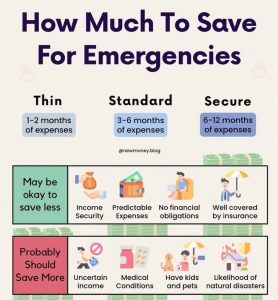
Refinance a Loan: Refinancing your loans can be a strategic financial move, significantly when interest rates have dropped since you initially secured your loans. This applies to various types of debt, including mortgages, student loans, and personal loans. By refinancing to a lower interest rate, you can reduce your monthly payments, which frees up cash that can be redirected toward savings or other financial priorities. Moreover, refinancing can decrease the total interest you pay over the life of the loan, potentially saving you a significant amount of money. It’s important to consider any fees associated with refinancing and compare these costs against the potential savings to ensure it’s a financially beneficial decision.
Buy Second-Hand: Shopping at second-hand stores, online platforms, and thrift shops is a cost-effective way to acquire clothes, furniture, and electronics. These venues often offer items at significantly reduced prices compared to new goods. Beyond the financial benefits, buying used items contributes to environmental sustainability by reducing waste and the demand for new products. This approach stretches your budget further and supports a more sustainable consumption pattern, making it an ideal choice for budget-conscious and environmentally aware consumers.
DIY Gifts: Creating personalized gifts through crafts like knitting, woodworking, or painting is a heartfelt way to show your affection and a practical approach to gift-giving. These homemade gifts often carry much more sentimental value than those bought from a store because they are infused with personal effort and creativity. Recipients tend to cherish these items for their unique qualities and the individual stories they represent, making them especially memorable. Additionally, opting to make gifts can be significantly more cost-effective, allowing you to manage your budget while still giving generously. Such gifts not only please the recipients but also reflect a commitment to thoughtful giving, often strengthening relationships.

Use Public Transportation: Utilizing public transportation instead of driving can be a highly effective way to save money on gas, parking, and maintenance costs. This is especially true in urban areas with extensive and well-integrated public transit systems. These systems are designed to be convenient and efficient, making them a viable alternative to car ownership or frequent ridesharing. Moreover, opting for public transit helps your wallet and benefits the environment. By reducing the number of vehicles on the road, public transportation lowers greenhouse gas emissions and contributes to cleaner air. This shift from individual car use to mass transit can significantly reduce your carbon footprint, supporting efforts toward environmental sustainability.

Plan Vacations in Off-Peak Times: Traveling during off-peak seasons is an excellent strategy for saving on costs and enhancing your travel experience. Due to lower demand, airfares and hotel rates often drop significantly during these times. Additionally, you’ll benefit from less crowded attractions, which can make your visit more enjoyable and allow you to explore destinations more thoroughly without the usual hustle and bustle. By planning your vacations during these quieter periods, you stretch your travel budget further and potentially enjoy a more relaxed and intimate atmosphere at popular tourist spots. This approach allows you to experience the true essence of the destination without the interference of large crowds.

Plan Vacations in Off-Peak Times
Create Budget Accountability: Having a budget accountability partner can significantly enhance your ability to maintain and adhere to your financial plans. This partner could be a friend, family member, or even a financial advisor with whom you regularly discuss your spending habits, savings goals, and financial progress. These discussions can be a powerful motivational tool, encouraging you to stay committed to your budget. An accountability partner can also offer a fresh perspective and help you adjust your financial strategies. This collaborative approach keeps you focused on your financial objectives. It introduces a level of support and encouragement that can make the journey toward financial stability less daunting and more achievable.
No-Spend Challenge: The “No-Spend Challenge” is a creative financial strategy where you commit to not spending any money on non-essential items for a set period, such as a week, a month, or even a day. The idea is to only spend on absolute necessities, like bills and groceries, while cutting out all discretionary spending, like dining out, shopping for clothes, or entertainment expenses. This challenge helps you save money and encourages you to evaluate your spending habits and identify areas where you can cut back permanently.
Final Thoughts: Regularly revisiting and adjusting your saving strategies is essential for effective financial management. As your life circumstances and financial goals evolve, so should your approach to managing your finances. This includes being flexible and open to incorporating new methods or tools that can help optimize your expenses. Conducting periodic reviews of your savings plan, budget, and overall financial strategies ensures they align with your current needs and goals. These regular check-ins allow you to make informed adjustments, whether reallocating funds to different savings goals, cutting unnecessary expenses, or tweaking investment contributions. By staying proactive and adaptable, you can continually refine your financial plan to support your long-term economic health better.
Conclusion
This guide has provided many creative and practical tips to enhance your savings. By integrating these strategies into your financial routine, you can significantly improve your financial stability and enjoy the process of saving. Start today, and take control of your financial destiny.



